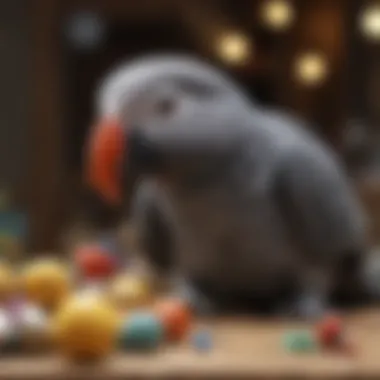Essential Vitamins for Healthy African Grey Parrots


Intro
Understanding the dietary needs of African grey parrots is crucial for ensuring their health and vitality. These birds are not just pets; they are companions that exhibit rich personalities and extraordinary intelligence. However, their well-being hinges significantly on proper nutrition, particularly vitamins. The following sections will explore various aspects of caring for African greys, focusing on essential vitamins and how to incorporate them into their diets effectively. This guide aims to support pet owners in fostering a thriving environment for their birds.
Understanding Your Pet
Pet Behavior Basics
African grey parrots are known for their inquisitive nature. They often mimic sounds and speech, reflecting their highly intelligent character. Understanding their behavior can help pet owners create an enriching space that meets their emotional and cognitive needs. Observing how your pet interacts with its environment can give you insight into its health and happiness.
Common Breed Characteristics
African greys have a variety of traits that distinguish them from other parrots. They typically weigh between 400 to 600 grams and possess feather patterns that make them visually striking. Their social structure is complex, as they thrive in groups and require companionship. Therefore, loneliness can lead to behavioral issues that negatively impact their health.
Species-Specific Needs
The nutritional needs of African grey parrots are unique. They require a balanced diet filled with vitamins A, D, E, and K, along with B-vitamins and essential minerals. It is important to research the specific requirements for this species. Ignoring these needs can result in nutritional deficiencies that have lasting health implications.
Pet Care and Maintenance
Feeding Guidelines
When creating a diet for an African grey, include a variety of foods. Fresh fruits, vegetables, pellets, and seeds should make up a significant portion of their daily intake. Here are key feeding guidelines:
- Offer a mix of fresh vegetables like carrots and leafy greens.
- Incorporate fruits such as apples and berries.
- Use high-quality pellets designed specifically for African greys, which include essential vitamins.
- Limit seed intake, as it can be fattening and lacks many required nutrients.
Grooming Essentials
Regular grooming is important for the well-being of African greys. This includes routine nail clipping and feather maintenance to prevent health problems. Engaging your pet in grooming sessions promotes bonding and ensures they remain comfortable.
Hygiene Practices
Maintaining a clean environment is crucial. Regularly clean their cage and replace bedding to prevent the buildup of waste. This will also minimize the risk of disease. Providing clean water daily is equally important for their hydration.
Health and Wellness
Routine Vet Check-ups
Regular veterinary check-ups are essential for ensuring your bird's long-term health. A vet familiar with avian species can provide guidance on vaccines and health monitoring.
Vaccination Needs
Consult with your vet regarding the necessary vaccinations. Some common health issues can be prevented through timely vaccinations, safeguarding the overall health of your African grey.
Recognizing Signs of Illness
Understanding how to identify signs of illness can prevent serious health issues. Look for changes in behavior, appetite, or appearance. A sudden loss of feathers, lethargy, or changes in vocalization often indicate health problems.
Enrichment and Activities
Indoor vs.
Outdoor Activities


Both indoor and outdoor activities play a significant role in the mental and physical health of African greys. Indoor play can involve structured games and environment manipulation, while outdoor time can offer natural stimuli which are crucial for mental well-being.
Interactive Toys and Games
Providing a range of toys is necessary to keep an African grey engaged. Toys that promote mental stimulation, such as puzzle games, can enhance their cognitive skills and reduce boredom.
Socialization Opportunities
Socializing your African grey with other birds or even family members can improve its emotional health. Birds are inherently social animals that require interaction for optimal emotional health.
Keeping a consistent routine will not only nurture your bird's well-being but also strengthen the bond between you and your feathered companion.
Understanding and addressing the unique needs of African grey parrots goes beyond basic care. By incorporating essential vitamins into their diet, following proper grooming routines, and engaging in meaningful activities, pet owners can significantly enhance their birds' quality of life.
Understanding the Nutritional Needs of African Grey Parrots
Understanding the nutritional needs of African grey parrots is crucial. These birds have unique dietary requirements that play a significant role in their overall health. A well-balanced diet promotes vitality, enhances their cognitive abilities, and prevents health issues.
The Importance of a Balanced Diet
A balanced diet is fundamental for African grey parrots. It includes a mix of fruits, vegetables, grains, and protein sources. This variety ensures that they receive all the essential nutrients. For instance, fruits are rich in vitamins, while vegetables provide fiber. Grains can be a good source of energy. Protein comes from nuts, seeds, and legumes. All these components work together to support their immune system and promote healthy feather growth.
Key Benefits of a Balanced Diet
- Enhances Immunity: Helps in warding off diseases by strengthening their immune system.
- Promotes Healthy Feather Growth: Necessary nutrients aid in achieving vibrant and strong feathers.
- Supports Cognitive Function: A diet rich in vitamins, like Vitamin E and B-complex, encourages brain health.
Maintaining a balanced diet requires careful planning. Pet owners need to ensure the right portions and variety to meet the unique needs of their African greys.
Role of Vitamins in Avian Health
Vitamins are vital for avian health. African grey parrots require specific vitamins to thrive. Each vitamin plays distinct roles and contributes to various bodily functions. For example, Vitamin A is essential for vision and maintaining healthy skin. Vitamin D is crucial for calcium metabolism, important for strong bones.
How Vitamins Benefit African Grey Parrots
- Promote Healthy Skin and Feathers: Vitamins A and E are particularly beneficial.
- Support Immune Function: Helps birds resist infections and diseases.
- Aid in Metabolism: B vitamins are necessary for converting food into energy.
Inclusion of vitamins in the diet safeguards against deficiencies that can lead to serious health issues. Therefore, knowing which vitamins are needed and how to provide them is key in diet planning.
Key Vitamins for African Grey Parrots
Understanding the key vitamins that African grey parrots need is vital for their well-being. These birds, known for their intelligence and sociability, thrive on a diet rich in essential nutrients. Vitamins play a significant role in maintaining their health, enhancing their immune system, and supporting various bodily functions. A balanced intake of these vitamins is crucial for their longevity and vitality. Pet owners must recognize the necessity of incorporating these nutrients into their birds' diets.
Vitamin A: Crucial for Vision and Immunity
Vitamin A is essential for a healthy visual system in African grey parrots. It supports their eyesight, which is vital for their overall behavior and environmental awareness. Moreover, it boosts the immune system. Birds lacking sufficient Vitamin A display signs of weakened immunity, leading to increased vulnerability to infections.
Sources rich in Vitamin A include dark leafy greens like kale and spinach, carrots, and sweet potatoes. Pet owners should ensure their parrots have access to these foods regularly, as they are crucial for preserving optimal health.
Vitamin D: Essential for Calcium Absorption
Vitamin D plays a critical role in calcium absorption, which is necessary for strong bones and overall skeletal health. African grey parrots, like many birds, cannot synthesize sufficient Vitamin D on their own, especially if they are kept indoors. Without adequate Vitamin D, they risk developing calcium deficiency, potentially leading to severe health issues such as bone deformities.
Exposure to natural sunlight is the best way to obtain Vitamin D. If natural light is not an option for indoor birds, UVB lighting can be a viable alternative, allowing for better calcium absorption.
Vitamin E: An Antioxidant Powerhouse


Vitamin E is well-known for its antioxidant properties. It helps protect body cells from damage caused by free radicals. This vitamin also supports a healthy immune system and is involved in several metabolic processes. Deficiency can lead to poor feather quality and reduced reproductive success.
Including foods like nuts, seeds, and avocados (in moderation) can help boost Vitamin E levels in their diet. These options are essential for promoting optimal health.
B Vitamins: Energy and Metabolism Support
The B vitamins serve as a good support system for energy production and metabolism. They help convert food into usable energy. Each B vitamin has unique roles, ensuring the overall well-being of African grey parrots. It is essential to identify specific B vitamins and their contributions to the bird's diet.
Vitamin B1 (Thiamine)
Vitamin B1, known as thiamine, is vital for energy metabolism. It is a key player in converting carbohydrates into energy. A lack of thiamine can lead to nervous system disorders. Therefore, ensuring an adequate intake is critical for overall health.
Sources of thiamine include whole grains and certain fruits. Integrating these into their diet can help maintain necessary energy levels.
Vitamin B2 (Riboflavin)
Vitamin B2, or riboflavin, is crucial for cellular functions and energy production. This vitamin aids in the metabolism of fats, proteins, and carbohydrates. A deficiency may manifest as poor feather conditions or skin issues.
Good sources of riboflavin include green leafy vegetables, eggs, and nuts. Adding these to their meals promotes better health overall.
Vitamin B6 (Pyridoxine)
Vitamin B6 is involved in protein metabolism and enzyme function. It supports neurological health and can improve mood and behavior in African greys. A lack of this vitamin can result in reduced appetite and poor energy levels.
Bananas and poultry are excellent sources of pyridoxine. Including such items can contribute to maintaining a balanced diet.
Vitamin B12 (Cobalamin)
Vitamin B12 is essential for red blood cell formation and neurological health. It plays a significant role in maintaining a healthy nervous system. A deficiency may cause lethargy and anemia.
Vitamin B12 is commonly found in animal products, making it critical for birds that have access to grains and animal protein. Ensuring a varied diet can help cover this vitamin's needs.
In summary, all these vitamins contribute significantly to the health and longevity of African grey parrots. It is the responsibility of pet owners to provide a balanced diet enriched with necessary vitamins to support their feathered friends.
Sources of Vitamins for African Greys
Understanding where to source the vitamins for African grey parrots is essential in providing them the proper nutrition they require for a healthy life. The right balance of vitamins can boost their immune system, enhance their overall well-being, and ensure longevity. This section will explore natural food sources and commercial vitamin supplements, highlighting the benefits and considerations of each.
Natural Food Sources
Natural food sources play a crucial role in the diet of African grey parrots. Fresh fruits and vegetables are the cornerstones of a nutritious diet. These foods not only deliver vitamins but also provide essential fibers and water content. Here are some key food sources to consider:
- Leafy greens: Kale, spinach, and Swiss chard are excellent sources of vitamin A, beneficial for vision and immune health.
- Fruits: Oranges, papayas, and berries contain vitamin C and other antioxidants that help bolster the immune system.
- Vegetables: Carrots and bell peppers are rich in beta-carotene, converting to vitamin A in the body.
- Nuts and seeds: They offer a good supply of vitamin E, which is vital for cellular health and preventing oxidative stress.
It is important to ensure that these natural sources are fresh and pesticide-free. Rotating different foods can also prevent boredom in your parrot’s diet and ensure a broad range of nutrients.
Commercial Vitamin Supplements
In some cases, it may be necessary to use commercial vitamin supplements to fill any gaps in an African grey parrot's diet. Supplements can provide a concentrated source of vitamins when natural foods are not enough. However, care must be taken to avoid over-supplementation, which can lead to toxicity.
Factors to consider when selecting vitamin supplements include:
- Form: Powders, pellets, or liquid forms can all be effective, but the bird's preference may dictate which is best.
- Vitamin content: Look for supplements that cover the essential vitamins needed, particularly A, D, E, and B vitamins.
- Quality: Choose reputable brands that specifically formulate products for birds, ensuring their safety and efficacy.


It's vital to consult with an avian veterinarian before introducing any supplements to your parrot's diet. They can offer personalized recommendations based on your pet's specific needs.
By understanding the sources of vitamins available for African grey parrots, pet owners can ensure that their feathered companions receive the nutrients necessary for optimal health and vibrant living.
Signs of Vitamin Deficiency in African Grey Parrots
Recognizing vitamin deficiencies in African Grey parrots is crucial for their health. The early identification of signs allows for prompt intervention, ensuring that these intelligent birds maintain their well-being. Deficiencies can lead to serious health issues, and understanding how to detect these problems is essential for pet owners. Inadequate vitamin intake can affect behavior, physical health, and overall vitality, making it vital to monitor their condition closely.
Behavioral Indicators
Behavioral changes are often the first signs of vitamin deficiency in African Grey parrots. These birds are known for their active and playful nature, so any alteration in their behavior can be alarming. Here are key indicators to watch for:
- Lethargy: A decrease in energy can be notable. A healthy African Grey should be lively and curious.
- Increased Aggression: Irritability or aggression may emerge, indicating discomfort or distress.
- Decreased Vocalization: African Greys are communicative. A noticeable drop in chatter or mimicry may signal health issues.
- Self-Mutilation: Feather plucking or other harmful behaviors might arise as a response to an unbalanced diet.
- Pacing and Restlessness: If your parrot displays anxious behavior or seems restless, it could be searching for nutrients.
These behavioral signs should not be ignored. Quick action can potentially reverse serious health effects.
Physical Symptoms
Physical symptoms of vitamin deficiency can be quite visible and should lead to a closer examination. Monitoring these aspects can guide pet owners toward necessary dietary adjustments. Critical symptoms to observe include:
- Weight Loss: Unexplained weight loss can indicate insufficient nutrient intake.
- Feather Health: Dull, brittle, or damaged feathers may reflect a lack of essential vitamins.
- Skin Issues: Dry or flaky skin often suggests deficiencies in certain vitamins, particularly Vitamin A.
- Weakness in Limbs: Difficulty in perching or clenching can point to calcium and vitamin D issues.
- Respiratory Problems: Labored breathing or unusual vocalizations could indicate serious underlying problems, potentially related to nutrition.
Monitoring these signs allows pet owners to take action. Consult a veterinarian if any symptoms appear. Young and old birds alike are vulnerable, so vigilance is crucial to maintaining their health.
In summary, recognizing behavioral and physical symptoms of vitamin deficiencies is the first step in addressing the health needs of African Grey parrots. An attentive owner can significantly improve the quality of life for these remarkable birds.
Preventing Vitamin Deficiency
Preventing vitamin deficiency is crucial for maintaining the health of African grey parrots. These birds require a variety of nutrients to thrive, and vitamins play a significant role in their overall well-being. A well-planned diet helps avoid common health issues associated with vitamin shortages, which can manifest in various behavioral and physiological signs. Pet owners should focus on the specific needs of their birds to create a balanced environment that supports optimal health.
Creating a Balanced Diet Plan
A balanced diet plan forms the foundation of good nutrition for African grey parrots. It must include a variety of foods that provide essential vitamins. The primary components of the diet should consist of fresh fruits, vegetables, high-quality pellets, and occasional seeds or nuts. Here are key considerations for creating a balanced diet:
- Fruits and Vegetables: Include leafy greens like kale and spinach, which are high in vitamins A and K. Fruits such as carrots and sweet potatoes are also beneficial.
- Quality Pellets: Opt for a pelleted diet specifically designed for African grey parrots. These pellets are often fortified with necessary vitamins and minerals that might be lacking in fresh food alone.
- Supplementation: In some cases, a vitamin supplement may be needed. Discuss with a veterinarian to determine if this is necessary for your bird's specific dietary needs.
Maintaining diversity in the diet is key, as each food item contributes different nutrients. This approach ensures that all vitamin requirements are met and minimizes the risk of deficiencies.
Regular Health Check-Ups
Regular health check-ups are an essential aspect of preventing vitamin deficiency in African grey parrots. Routine visits to an avian veterinarian are vital for monitoring a bird's health status. These check-ups can catch potential deficiencies early before they become serious problems.
During these appointments, veterinarians can assess the bird's overall health and perform necessary tests. Some important factors to monitor include:
- Blood Tests: These can measure vitamin levels and detect any deficiencies.
- Weight Monitoring: A sudden weight change can indicate nutritional issues, prompting further investigation.
- Behavioral Observations: Vets can evaluate changes in behavior that may signify health problems related to nutrition.
Incorporating regular health examinations into the care routine can greatly enhance an African grey parrot’s quality of life. It ensures that any vitamin deficiencies are addressed swiftly, aiding in the prevention of serious health issues down the line.
Regular check-ups are essential for proactive health management in African grey parrots.
End
In this article, we have examined the crucial role vitamins play in the overall well-being of African grey parrots. A deep understanding of their nutritional needs, especially concerning vitamins, is fundamental for pet owners and enthusiasts. The interconnectedness of a balanced diet ensures that these parrots thrive both physically and mentally.
Summary of Key Points
- Balanced Diet: It is essential for African grey parrots to have a well-rounded diet rich in natural and supplemented vitamins. This not only helps maintain health but also encourages proper behavior.
- Key Vitamins: Vitamins A, D, E, and the B vitamins are crucial. Each serves a unique purpose, from supporting vision to enhancing metabolism.
- Sources of Vitamins: Natural food sources, such as fruits and vegetables, along with commercial supplements, can aid in providing necessary nutrients.
- Signs of Deficiency: Being aware of behavioral changes and physical symptoms can help in identifying vitamin deficiencies early.
- Prevention: A proactive approach, including regular health check-ups and creating a personalized diet plan, aids in preventing deficiencies.
Final Thoughts on Caring for African Grey Parrots
Caring for an African grey requires commitment and knowledge about their specific needs. When leaders in avian health practices are put into place, pet owners can nurture their birds towards optimal happiness and health. Regularly evaluating their diet, understanding their behavior, and ensuring access to essential nutrients are steps that cannot be overlooked. As intelligent and social creatures, African greys thrive when they receive the right care and attention. For pet owners, this responsibility is both a privilege and a requirement. Ensuring these birds are nourished properly is the foundation of a long and healthy companionship.







